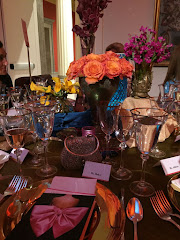Middle Eastern Manners - Part II
Arab Languages are related to Hebrew, Aramaic, Syriac. Thee are dozens of regional dialects. There are 28 letters and the language is written and read right to left and spoken by over 150 million people.
Regional dialects include: Egyptian, Iraqi, Gulf, Levantine.
Family is the foundation of Arab society. Identity is based on heritage of desert, nomadic culture. Arabs have a keen sense of social rank and clan identity.
Names are formed for you by your Patrilineal string. Other than your formal first name given to you by your parents, your name is done already. The structure is: Formal given first name + Abd (servant of), + bin(m) or bint(f), + Father's first name, + Paternal Grandfather's first name, + tribe or region. An example is my name: Katherine Abd bint Bruce Chester Seneca Falls
Honor and Dishonor are very important in Arab culture. "Saving Face" in the group is paramount. A woman's honor is based on her behavior. A man's honor is based on his behavior and the behavior of all of his family members, particularly the female family members. The pressure to restore one's honor when shamed can be enormous. Chastity is directly related to one's honor. Islam and Arab society segregate the sexes from puberty. Covering a woman's body is done out of modesty and is essential. The Qur'an (Koran) says only the hair has to be covered. The "Black Burka" is worn only by family modesty. Men are also required to dress modestly.
Women are limited to one husband. Men may have up to four wives. Arranged marriages exist, but are frowned upon.
Arab Culture dictates that Group Rights trump Individual Rights. Different from most Western Cultures, desert cultures emphasize group survival secondary to the individual comfort. Decisions are made by consensus, and again, different from Western countries, Arab countries prefer consultation with regional neighbors. This fact alone emphasizes the importance of U.S. coalition-building.
In Arab culture, nothing happens unless it is the will of God or as they say: "If God Wills." Negatively speaking, this way of thinking can foster a culture of blamelessness and a reluctance to accept responsibility, and a lack of self-criticism.
Similar to European etiquette, hand gestures to avoid include: pointing with an index finger or pencil and the "OK" or "Thumbs up" hand gestures. Keep your hands out of yor pockets. Also, the left hand is considered unclean as it is used for toileting. Always eat with the right hand. If you steal and are convicted, your right hand will be cut off, thus forcing you to eat with your left hand for the rest of your life, which is considered to be the greatest insult.
When speaking to an Arab: always stand up straight, and stand for all introductions. Keep your hands out of your pockets. Keep the soles of your feet always on the floor. Placing your right hand on your chest at greeting denotes respect and thankfulness. Dressing too casually is considered to be disrespectful.
Arabs care more for sincerity and respect than exact observance of cultural norms. Enjoy time spent with your Arab friends. Be sensitive, but relax. Show your interest in their culture!
*This information is from a seminar I attended at The Protocol School of Washington. This session was taught by Cynthia Rambo, Chief of Protocol, Shaw Air Force Base.
Saturday, October 3, 2009
Subscribe to:
Comments (Atom)









